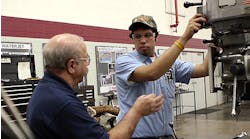It seems that wherever I go lately the discussions invariably turn to age and aging. We end up waxing nostalgic as we discuss how things used to be, what we used to do or what we used to be able to do, and what people used to be around. During one of these discussions, a foundry colleague and I began to realize that we were no longer the young folks but were actually the “seasoned” veterans of the foundry industry.
As this realization began to sink in — slowly of course due to advancing age! — and one begins to really think about the foundry industry, there is both trepidation and excitement. On the one hand, many of us feel that we are rapidly losing a wealth of knowledge due to consolidations in the industry and the natural progression of time. Though technology moves at a frightening pace, some very basic foundry principles may get lost when the people who knew so much have moved on.
On the other hand, it is also very exciting to look at all the young people that are moving into the foundry industry. There are many bright, energetic people starting their careers at foundries and suppliers bringing new life into the voids we were so worried about filling.
It is this mix of tradition and innovation that I present to you in this annual Casting Industry Supplier Association (CISA) issue of Foundry Management and Technology. Our organization has faced many challenges as the general number of suppliers has decreased and priorities have changed. We have survived these challenges through the strong ties that bind the members of this organization together. It is a rock-solid foundation steeped in tradition from our former members mixed with new and innovative ideas to keep the organization vital. During our annual meetings we discuss industry issues as we try to re-educate ourselves to new technologies and business philosophies.
CISA is a unique organization within the metalcasting industry and I hope you enjoy reading about our membership in this issue. I urge you to consider membership and for more information contact Roger Hayes at 623-547-0920.
I guess you can spend time being nostalgic about the good old days and worrying about the future, but I prefer it this way. The past is gone but not forgotten and the future is far away; all we have is today. That is why it is called the “present.”








